Theodore and Woodrow: How Two American Presidents Destroyed Constitutional Freedom by Napolitano Andrew P

Author:Napolitano, Andrew P. [Napolitano, Andrew P.]
Language: eng
Format: epub
Tags: ebook
Publisher: Thomas Nelson
Published: 2012-11-13T00:00:00+00:00
Theodore Roosevelt: The Trustbuster
The power for the federal government to regulate interstate commerce comes from Article 1, Section 8, of the Constitution, or the Commerce Clause. The Commerce Clause grants Congress the power to “regulate Commerce with foreign Nations, and among the several States, and with the Indian Tribes.” The Supreme Court in Charles River Bridge v. Warren Bridge,7 in 1837, defined the right of the federal government to police property rights and to limit them is in the public interest as implied in the Commerce Clause. In this case, the Massachusetts legislature incorporated the Charles River Bridge Company in 1785 to build a bridge which would collect tolls. In 1828, the legislature created the Warren Bridge Company to build a free bridge in the same area. The Charles River Bridge Company argued that this new bridge took away its tolls and traffic, and violated the initial contract. The Court ruled on the side of the State, holding that the interest of the community in creating new channels of travel and trade outweighed the private interest of the Charles River Bridge Company. This case established the lamentable principle that with respect to interstate commerce, rights of ownership are subordinate to rights of the community.8
The Supreme Court affirmed this theory in the 1877 case of Munn v. Illinois,9 which established that private property that involves the public must submit to being controlled by the public for the common good. In 1871, the Illinois legislature responded to pressure from a farmers’ association called the National Grange and set maximum rates that private companies could charge for grain storage. The private Chicago firm Munn and Scott was charged with violating this law by charging less than its competitors. The Supreme Court held that a state may regulate these private practices, since grain storage involves the public interest. Justice Waite, writing for the Court, stated, “When property is affected with a public interest, it ceases to be juris privati only.”10 He obviously spent more time reading Das Kapital than The Wealth of Nations or even the U.S. Constitution.
Increasing government regulation of private ownership for the good of the public interest is the basis for anti-trust legislation. However, these early cases show that the Supreme Court was significantly overreaching in allowing states to interfere with private property rights. The Court established this extremely vague “public interest” justification which would be used throughout American history to justify unprecedented amounts of governmental regulation and thus destruction of private property.
Anti-trust regulation also prohibits the free exchange of private property and hinders the ability of people to enter into agreements out of their own free will. The horrors portrayed to the public during the Progressive Era were pervasive and persuasive enough that few questioned the motives or desirability of anti-trust laws.
Adding fuel to the fire were actual crooks who took advantage of the free-market system, often with aid from the government. It is clear, as the chairman of the Ludwig von Mises Institute, Llewellyn H. Rockwell Jr., states, anti-trust laws are “a political weapon that accomplishes no social good and imposes much social harm.
Download
Theodore and Woodrow: How Two American Presidents Destroyed Constitutional Freedom by Napolitano Andrew P.epub
This site does not store any files on its server. We only index and link to content provided by other sites. Please contact the content providers to delete copyright contents if any and email us, we'll remove relevant links or contents immediately.
The Secret History by Donna Tartt(19052)
The Social Justice Warrior Handbook by Lisa De Pasquale(12187)
Thirteen Reasons Why by Jay Asher(8893)
This Is How You Lose Her by Junot Diaz(6877)
Weapons of Math Destruction by Cathy O'Neil(6264)
Zero to One by Peter Thiel(5786)
Beartown by Fredrik Backman(5737)
The Myth of the Strong Leader by Archie Brown(5499)
The Fire Next Time by James Baldwin(5431)
How Democracies Die by Steven Levitsky & Daniel Ziblatt(5215)
Promise Me, Dad by Joe Biden(5141)
Stone's Rules by Roger Stone(5081)
A Higher Loyalty: Truth, Lies, and Leadership by James Comey(4954)
100 Deadly Skills by Clint Emerson(4921)
Rise and Kill First by Ronen Bergman(4779)
Secrecy World by Jake Bernstein(4741)
The David Icke Guide to the Global Conspiracy (and how to end it) by David Icke(4707)
The Farm by Tom Rob Smith(4502)
The Doomsday Machine by Daniel Ellsberg(4484)
